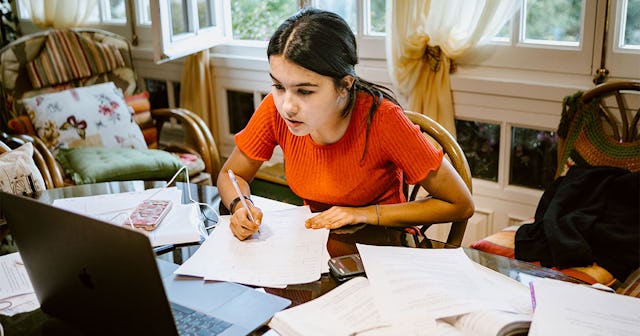Some Tweens Found Their Groove Through Online Learning — Including Mine

Often, headlines around distance learning or virtual learning are negative, but for many families, virtual schooling is here to stay, either permanently or for at least another school year as parents with children under twelve face the reality that a vaccine for their children will likely not be available until mid-winter.
For many families, including my own, virtual learning offered a welcome change. It gave parents valuable insight into the schooling process and into their child’s strengths and weaknesses as learners. In many cases, this translated to key growth opportunities, especially for tweens.
The tween years, in general, are unique and challenging times. Bodies begin to change, self-consciousness around these bodily changes set in, social dynamics with peers shift, and the most appropriate school setting can make a big difference for a child going through so much.
A positive virtual learning experience can provide tweens with a safe space to explore new social dynamics, learn at their own pace, and navigate the many changes they are facing without the elements that are present, at times, at brick and mortar schools: bullying, large class sizes, wasted transitional time, social cliques, and more.
My 12-year-old thrived in a distance learning setting that matched his interests and priorities with academic instruction. He appreciated the opportunity to create social experiences that lined up with his interests and involved other students that were respectful and kind to each other, students who honored each other’s unique points of view, backgrounds, and interests after struggling a bit with the playground politics and dynamics at his previous brick and mortar school.
I’ve spoken with other tween parents who also saw their children thrive during this time. Some are staying virtual and others are going back to school when it is safe to do so, but all agreed that their children benefited from distance learning. Marin, whose son is dyslexic and has ADHD, appreciated that her son’s school, WorldOver International School, empowered her son to embrace what makes him unique. Since their classes are customized for all students, her son never felt that he was being singled out for specific support because of his learning differences, which had been a challenge in the past at his brick and mortar school.
Similarly, her immunocompromised 10-year-old daughter benefited from virtual learning as her medical condition no longer inhibited participation and engagement as it had before when she would miss excessive days of class for medical reasons. With distance learning, which she did through her local public school, she was able to continue attending class even from her hospital bed and to gain important independence as she learned to do more medical caretaking for herself. The change was incredible and the family has decided to stay with distance learning for their 5th and 7th graders, despite both parents working full-time from home, sometimes with the mother working over 100 hours each week and caring for other children.
Her son shared that his virtual learning experience helped him see that he was smart and that he, in fact, found the experience less isolating than the brick and mortar setting had been.
All of the families I spoke with praised the flexibility that virtual learning offered in terms of where they schooled. They also appreciated that virtual schooling meant less time was wasted in transition and that their children had opportunities to focus on independent learning projects.
Most families were new to virtual learning because of the pandemic, but some families had been doing this for years. Jill, a mom of two boys, 9 and 12, switched to virtual learning four years ago and has never looked back. Her experience with iLead Exploration has been positive. She knows her children are learning what their peers are learning, but appreciates the flexibility to expand beyond that, engage in supplemental activities and to make learning a way of life. “It’s awesome to be able to tailor school to your child’s needs on any particular day,” Jill shared. Now that both of her boys are tweens, she’s particularly attuned to their social and emotional development and appreciates that their learning environment is free of some of the social drama and stress that is often typical of the brick and mortar middle school experience. Her sons appreciate having more control over their social experiences. It’s truly a win-win.
Whether families were new to distance learning this past year or were experienced homeschooling families taking advantage of the growing array of virtual learning tools now available to them, all of the parents I spoke with agreed that the tween years are an intense time, socially and emotionally. Their social and emotional needs seemed to benefit from the ability to control stimuli and to work in a quiet environment; social and emotional needs dovetailed with academic needs to create a positive experience. Those in small group settings gained leadership skills, and parents saw their confidence soar. Many parents also reported that their children acquired new skills during this time, specifically around organizing their time and managing schedules, key skills for tweens to learn.
This was true for my children too. They thrived and embraced the opportunity to manage their learning and time more effectively. They also embraced virtual opportunities for social engagements that they could control more effectively than random playground encounters. Yes, there were many bumps and challenges along the way, but overall it’s important to add to the narrative around distance learning that while it didn’t work for everyone, it is a viable and valuable option for some students.
This article was originally published on